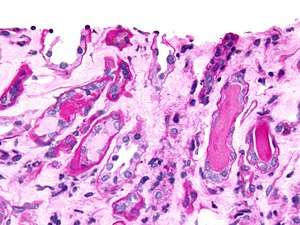Myeloma cast nephropathy
Myeloma cast nephropathy, also referred to as light-chain cast nephropathy, is the formation of plugs (urinary casts) in the renal tubules from free immunoglobulin light chains leading to renal failure in the context of multiple myeloma. It is the most common cause of kidney injury in myeloma.[1]
| Myeloma cast nephropathy | |
|---|---|
| Other names | Cast nephropathy |
 | |
| Micrograph of myeloma cast nephropathy. Myelomatous casts are PAS negative (left of image). Hyaline casts are PAS positive (right of image). PAS stain. Kidney biopsy. | |
| Specialty | Nephrology |
In myeloma cast nephropathy, filtered κ or λ light chains that bind to Tamm-Horsfall protein precipitate in the renal tubule. Hypercalcemia and low fluid intake contribute to the development of casts.[2]
Myeloma cast nephropathy is considered to be a medical emergency because if untreated, it leads to irreversible renal failure.[1]
It is diagnosed by histological examination of kidney biopsy.[1]
See also
References
- Comprehensive Clinical Nephrology (6 ed.). Elsevier. 2019. pp. 767–775.
- Pocket Companion to Brenner and Rector's The Kidney (8 ed.). Elsevier. 2010. pp. 250–284.
| Classification |
|---|
This article is issued from
Wikipedia.
The text is licensed under Creative
Commons - Attribution - Sharealike.
Additional terms may apply for the media files.